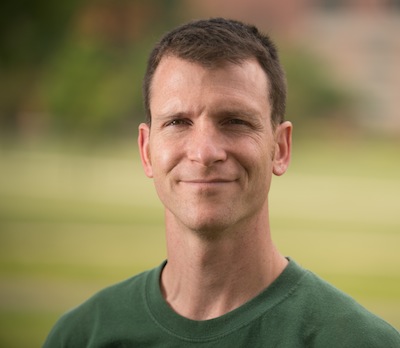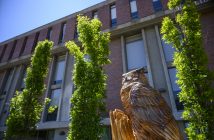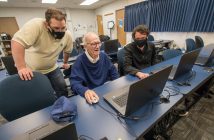Students take part in new classes and projects here and abroad as part of Westfield Engages initiative.
The University is in its second year of a three-year grant to grow in terms of its community service and civic engagement. The initiative is called “Westfield Engages,” or WE.
As part of this effort, and to build on its historically predominant philosophy of community service, Westfield State has designed—and redesigned—several academic courses. The goal for the next two years is to bring a total of 17 classes that include a civic engagement component to the students at Westfield State.
“We have a situation where many classes lend themselves to civic engagement,” says Brian Conz, Ph.D., a professor with Geography and Regional Planning (GARP) and also the director of civic engagement. “For example, we have education students doing student teaching in neighboring communities, nursing students going to Guatemala and social work students volunteering in urban areas.”
In a team effort, Dr. Conz and Vanessa Diana, Ph.D., of the English Department are leading two stand-alone courses during the fall 2014 semester that focus on Stanley Park, the 300-acre park that is directly across from the University.
Dr. Conz is teaching Physical Geography, in which students engage in multiple lab sessions with field work performed in Stanley Park that is designed to make them familiar with the geographic processes, flora and fauna. “This course manifests what we do in GARP, which is education using a local context to engender and foster a love of place,” Dr. Conz says. “That ideally translates into a sense of responsibility and stewardship. In other words, know a place, love it and care for the species and people who inhabit it.”
Dr. Diana is teaching the first-year English Composition course. Her students have numerous and varied assignments about the park. For instance, they are writing about Stanley Park’s role in the community; assessing and creating websites and social media pages devoted to the park; supporting campaigns to raise awareness on campus about park issues; and inviting fellow students to engage in service activities at the park.
Dr. Diana’s students are also writing about “a sense of place,” conducting research projects based on issues related to the park environment and gathering an awareness of the “behind the scenes” volunteers, boards and residents who protect and maintain the grounds.
“Because Stanley Park is a beloved gem in Westfield and the surrounding community and functions as an extension of the campus, an effort to benefit the park through service projects will enrich the greater community and express Westfield State University’s appreciation for the park,” says Dr. Diana.
Another new course stemming from the WE movement comes from the Movement Science, Sport and Leisure Studies Department and is called Wilderness Leadership. Taught by Kevin Tatsugawa, Ph.D., it’s a course about outdoor recreation with a strong link to the fact that many recreation areas are on public lands.
With a particular emphasis on building and maintaining hiking trails, students are learning that people need to share in the upkeep of these spaces. Dr. Tatsugawa plans on taking the students to a number of locations. They will be working at Farley Ledge in Erving and Rose Ledge on Northfield Mountain in Northfield to maintain the trails that lead to these rock climbing areas, referred to as “crags.”
Dr. Tatsugawa is also eyeing Cathedral Ledge in North Conway, N.H., as another potential trail to visit and study. “These recreation areas are supported by volunteer groups who maintain the trails,” says Dr. Tatsugawa. “This is not a one-time cleanup.”
What makes the course important is students also learn about the politics of trail management and fundraising. Dr. Tatsugawa says, “When you go out and enjoy recreational land, you take something from it. I remind students that they need to give something back to the land.” The course takes service learning and embeds it in a larger context of involvement in the world and responsibility to others.
During the January 2015 winter break, Robin Marion and Wilma Ortiz-Marrero, Ph.D., both of the Education Department, will lead a service trip to practice civic engagement in Puerto Rico. During the winter months, the students will travel to Puerto Rico and perform service in the schools and for the community at large.
Scheduled for the spring 2015 semester, English Department professors Catherine Savini, Ph.D., and Chalet Seidel, Ph.D., will embed civic engagement into English Composition II with a course called Writing About and For Social Change. Students will examine the broad range of social change topics and learn to articulate them in an effort to work toward positive social change.
Timothy LeDoux, Ph.D., is teaching the Geography of Hunger and Poverty in the United States, which will examine the nature and extent of hunger and poverty from a geographic perspective. A Geography and Regional Planning course, it examines the socio-spatial phenomenon that is seen globally, nationally and in neighborhoods and households.
“We will study advocacy issues around food insecurity—low-income households that are struggling for food,” says Dr. LeDoux. The class will learn about SNAP (the Supplemental Nutrition Assistance Program) and how the government addresses food poverty.
Students will also analyze the spatial distribution of poverty and hunger through an exploration of regional, state, rural, suburban and intra-metropolitan areas. “Through an exploration of these spaces, students will determine the causes and consequences of hunger and work to shape public policy programs to alleviate these conditions,” says Dr. LeDoux.
Students will be working with community organizations as active advocates to improve access to food and end what LeDoux calls “food deserts.”
Beause Dr. LeDoux was awarded the prestigious STARS (Semester Time Award for Research and Scholarship) fellowship to study the history and evolution of the urban food environment in Detroit, Mich., this course is rescheduled for 2015.




